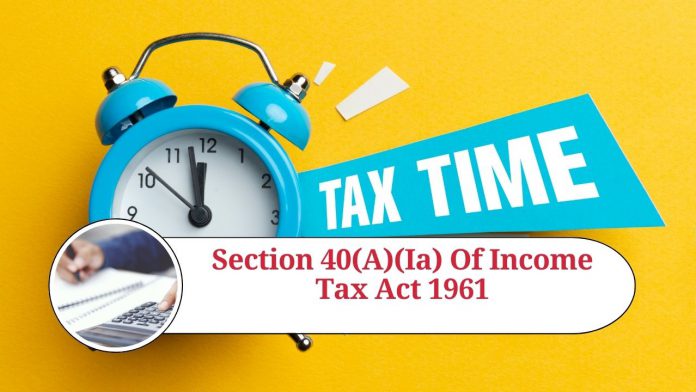The Income Tax Act, of 1961 is a comprehensive tax legislation in India, which covers a wide range of topics related to income tax, including tax rates, exemptions, deductions, and penalties. One of the important provisions of this act is Section 40(a)(a), which deals with the deduction of tax at source (TDS) on payments made to contractors and professionals. In this article, we will provide an overview of Section 40(a)(a) and its implications for taxpayers.
What is Section 40(a)(a)?
Section 40(a)(a) of the Income Tax Act, 1961 deals with the disallowance of expenses in case of non-deduction or non-payment of TDS on payments made to contractors and professionals. According to this section, any sum payable to a resident contractor or professional, which is subject to TDS under Chapter XVII-B of the Income Tax Act, 1961, and is not deducted or paid during the previous year in which the expense was incurred, will not be allowed as a deduction while computing the income of the payer.
In other words, if a taxpayer fails to deduct TDS or fails to pay the same to the government on payments made to contractors or professionals, the number of such payments will not be allowed as a deduction while computing the taxable income of the taxpayer.
Who is a contractor or professional under Section 40(a)(a)?
The term ‘contractor’ refers to a person who is engaged in any work related to the construction, repair, renovation, or demolition of any building, bridge, dam, road, or other structure. The term ‘professional’ refers to a person who is engaged in any profession, such as legal, medical, engineering, architectural, or accountancy, and provides services to others.
When is TDS applicable under Section 194C and Section 194J?
TDS is applicable on payments made to contractors under Section 194C and on payments made to professionals under Section 194J. Section 194C applies to payments made for work contracts, which include any agreement for carrying out any work, including the supply of labor for carrying out any work. Section 194J applies to payments made to professionals, which include fees for professional services such as legal, medical, engineering, architectural, or accountancy services.
What is the rate of TDS under Section 194C and Section 194J?
The rate of TDS under Section 194C is 1% for payments made to an individual or a Hindu Undivided Family (HUF), and 2% for payments made to any other person. The rate of TDS under Section 194J is 10%.
What are the implications of Section 40(a)(ia) for taxpayers?
Section 40(a)(ia) has significant implications for taxpayers who make payments to contractors and professionals. If a taxpayer fails to deduct TDS or fails to pay the same to the government on such payments, the number of such payments will not be allowed as a deduction while computing the taxable income of the taxpayer. This means that the taxpayer will have to pay tax on the entire amount of the payment, even if the payment was made for a legitimate business purpose.
For example, if a company pays Rs. 10 lakhs to a contractor for construction work and fails to deduct TDS or pay the same to the government, the company will not be allowed to deduct the entire amount of Rs. 10 lakhs as an expense while computing its taxable income.
Read more useful content:



















